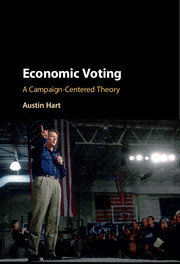Book contents
- Frontmatter
- Dedication
- Contents
- List of Figures
- List of Tables
- Acknowledgments
- 1 The Economic Voting Puzzle
- 2 A Campaign-Centered Theory of Economic Voting
- 3 Can Ads Prime the Economy? How Would We Know? US 1992
- 4 The Impact of a Surge in Economic Messages: Mexico 2006
- 5 The Absent Economic Message: US and Mexico 2000
- 6 The Campaign-Centered Model in Comparative Perspective
- 7 Conclusion
- Appendix
- References
- Index
5 - The Absent Economic Message: US and Mexico 2000
Published online by Cambridge University Press: 05 September 2016
- Frontmatter
- Dedication
- Contents
- List of Figures
- List of Tables
- Acknowledgments
- 1 The Economic Voting Puzzle
- 2 A Campaign-Centered Theory of Economic Voting
- 3 Can Ads Prime the Economy? How Would We Know? US 1992
- 4 The Impact of a Surge in Economic Messages: Mexico 2006
- 5 The Absent Economic Message: US and Mexico 2000
- 6 The Campaign-Centered Model in Comparative Perspective
- 7 Conclusion
- Appendix
- References
- Index
Summary
We couldn't let the [2000 US presidential] election become a referendum on the past.
– Karl Rove, Chief Strategist for George W. Bush, Author Interview, 2011We focus-grouped our message [of “change” in the 2000 Mexican presidential election] like hell … It had to be perfect.
– Vidal Romero, PAN Pollster, Author Interview, 2011To this point, I have shown that presidential candidates in two elections primed the economic vote strategically. They increased the frequency with which they televised economic campaign ads, and voters, to the extent that they were exposed to the ads, responded by reevaluating the candidates along economic lines. This is consistent with the predictions of a priming-based model of economic voting and is a crucial step in demonstrating that political communications condition the strength of the economic vote. However, not all candidates take up the economic banner as the centerpiece of their message, and very few campaigns revolve around the economy as centrally as they did in the 1992 US and 2006 Mexican presidential elections. What, then, happens to the economic vote when candidates choose not to or are unable to talk about the economy (i.e. when the proposed “treatment” is absent)?
In this chapter, I answer this question by analyzing the 2000 US and 2000 Mexican presidential elections. I select these “control” cases because economic campaign messages were memorably absent throughout both campaigns. In the lead up to the US 2000 election, the dialogue between the two major parties' nominees – Republican challenger and Texas Governor George W. Bush (hereafter G.W. Bush to distinguish him from George H.W. Bush) and sitting Vice President Al Gore – focused on a wide and ever-changing array of issues: education, social security, immigration, the environment, Christian morality, trustworthiness, and more. Yet the candidates said very little about the nation's unprecedented prosperity, which, following the conventional economic voting wisdom, should have made the election outcome a foregone conclusion. Gore never sustained an effort to activate the economic vote and, for long stretches of the campaign, actually aired fewer economic messages than his Republican opponent.
While economic messages were similarly absent in the 2000 Mexican election, the theme of democracy wholly dominated the campaign.
- Type
- Chapter
- Information
- Economic VotingA Campaign-Centered Theory, pp. 95 - 117Publisher: Cambridge University PressPrint publication year: 2016



